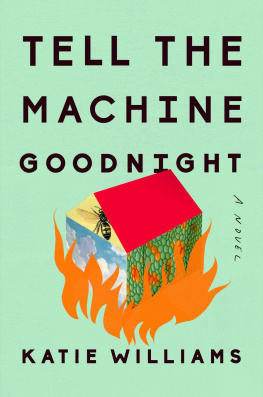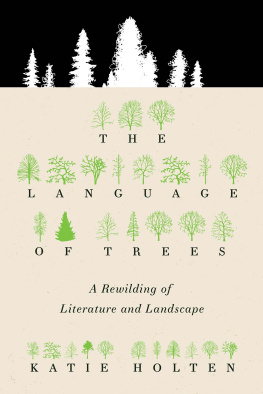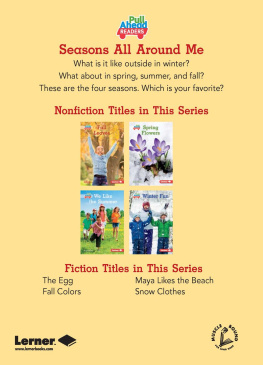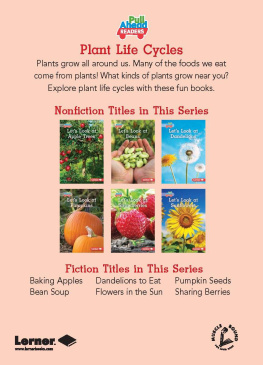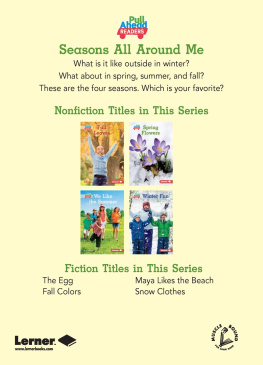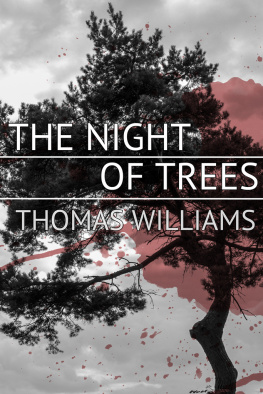Katie Williams - The Space Between Trees
Here you can read online Katie Williams - The Space Between Trees full text of the book (entire story) in english for free. Download pdf and epub, get meaning, cover and reviews about this ebook. year: 2010, publisher: Chronicle Books LLC, genre: Detective and thriller. Description of the work, (preface) as well as reviews are available. Best literature library LitArk.com created for fans of good reading and offers a wide selection of genres:
Romance novel
Science fiction
Adventure
Detective
Science
History
Home and family
Prose
Art
Politics
Computer
Non-fiction
Religion
Business
Children
Humor
Choose a favorite category and find really read worthwhile books. Enjoy immersion in the world of imagination, feel the emotions of the characters or learn something new for yourself, make an fascinating discovery.

- Book:The Space Between Trees
- Author:
- Publisher:Chronicle Books LLC
- Genre:
- Year:2010
- Rating:3 / 5
- Favourites:Add to favourites
- Your mark:
- 60
- 1
- 2
- 3
- 4
- 5
The Space Between Trees: summary, description and annotation
We offer to read an annotation, description, summary or preface (depends on what the author of the book "The Space Between Trees" wrote himself). If you haven't found the necessary information about the book — write in the comments, we will try to find it.
The Space Between Trees — read online for free the complete book (whole text) full work
Below is the text of the book, divided by pages. System saving the place of the last page read, allows you to conveniently read the book "The Space Between Trees" online for free, without having to search again every time where you left off. Put a bookmark, and you can go to the page where you finished reading at any time.
Font size:
Interval:
Bookmark:
Deep thanks to my parents, Beth and Frank Williams, for their love and support and for never once suggesting that I might just be sensible and go to law school. Thanks, too, to Laura Furman for her friendship and mentorship and for the phone call she made over her summer break telling me to write this novel.
I am near worshipful of my agent, Judy Heiblum, for her candor, strength, and smarts, and of my editors, Julie Romeis and Mary Colgan, brave warriors of the writing process. These three made this book better than it was.
Thanks to the Michener Center for Writers for their support and to my teachersMichael Adams, Laura Furman, and Elizabeth Harrisfor their guidance.
I have had help from friends along the way. Thanks to Dr. Matthew Wemple for lending me his expertise. My gratitude to Riley Hoffman, Morgan Johnson, and my San Francisco workshop group for the early reads and to Kris Bronstad, James Hannaham, and Susie Meserve for the later reads. My gratitude for their friendship, too.
Finally, special thanks to Ulysses Loken for walking me around the block when I get muddled and all the rest of it.
KATIE WILLIAMS is a graduate of the MFA program at the University of Texas in Austin and has published numerous short stories for adults. She lives in San Francisco, where she currently teaches writing at the Academy of Art. This is her first novel.
IM IN HOKEPE WOODS this morning, like I am every Sunday, delivering papers and keeping an eye out for Jonah Luks. Its early when I drive into the neighborhood, so everyones still sleeping. Me, Im wide awake to see all those Hokepe houses cast in blue like the light in a movie theater after the credits have gone up and out. The streets are real quiet, too, not even one lone dog-walker yanking his pup away from something it wants to sniff. I pull Moms car to the curb where Jonah always parks his truck. No truck, thoughtoo early for Jonah Luks. When I step out of the car, my breath puffs in front of me like some strange language Im speaking. Its early March and the snow is finally off the ground, but not the frost yet, and this early, its chilly out. I try to sink into itmy couple hours in the coldand drag my satchel from the backseat, lifting the strap over my head.
The paper route is something Ive had since I was eleven. Eleven-year-olds arent expected to stick with things, but Ive stuck with this, and now Im sixteen and the oldest paper carrier on the list by about three years. The only girl, too. This doesnt embarrass me. I like the job. Anyway, its better than dripping medicine into some neighbor kids ear or getting my arms sticky scooping ice cream out of a tub. The beauty of a paper route is this: You put a paper on a doormat. Done.
Also, I like the Hokepe houses. They have these details to themwindowpanes tinted green like theyve been made from pop-bottle glass, brass sundials that cast spiky shadows, bunches of clematis so thick it looks like you could stick your hands in them and climb straight up a wall, stained-wood porches, peaked windows, speckled bricksall the good stuff. Theyre worlds different from the houses Mom and I rent, like the one we have now, with its screen doors sagging like a bodys pressed against them, the shag carpets hopping with fleas, and someones greasy head stain on the wall above my bed. Now, its not like youd call the Hokepe houses mansionsthey arent big or showy enough for thatits more that everything has been thought about and put in its right place, and so when you step up to one of their doors, you kind of feel like youve been considered and put in your right place, too.
Hokepe isnt that large a neighborhood, but almost every house orders a Sunday paper. It usually takes me two hours to finish my paper route. I like to do the blocks in the middle of the neighborhood first and save the ones on the edgesthe ones surrounded by the woodsfor later. But today I must be walking slower than usual because Im only halfway done with the middle houses when I notice that the sun has gotten its hairline up over the ground, which means that its time to catch Jonah Luks. Jonah must be slow this morning, too, because when I get back to the place where he parks, his truck still isnt there. So I drag out the next few deliveries, rearranging the contents of my satchel, straightening any askew doormats, and setting both feet on each porch step. A few minutes later, I hear Jonahs old engine rattle, so I run back to the house next to where hell park and pretend Im just coming down its front walk, even though I already delivered a paper there half an hour ago. Jonah pulls into his usual spot along the curb, and I can see that salt and rust have turned the bottom of his doors into lace. When he gets out, he pats the side of the truck, like its done a good job getting him there, which I guess it has.
I call out, and Jonah raises a hand. No one looks as good raising a hand as Jonah does. I dont know why that is. Maybe its something to do with the angle of his palm or the torque of his wrist. When Jonah waves, he looks like he could be hailing his golden retriever or his old, doting grandmother or his college roommate (though probably not the last one, since Jonah dropped out of college two years ago).
I am, of course, none of these. But I pretend to be as important as each of them as I wave backin fact, more important than all of them added up together. Jonah lets his hand drop and gets so busy rummaging in the bed of his truck that Im able to walk all the way over to him without him even noticing me. When I tap him on the shoulder, he jumps.
Boo, I say.
Boo, you, he says.
Youre late. Did you have a late night? Did you stay out and party? Did you drink until the sun came up?
He frowns and returns his attention to his truck. The words Jefferson Wildlife Control, stenciled on its side, are peeling a little at their feet. I push the bottom of one of the ls down, but it rolls back up again. Jonah is trying to get out his sled, but its stuck, the prow of it jutting up out of the truck bed, the stern trapped under some junk. He has so much trash in his truck its like he was raised by raccoons.
Its like you were raised by raccoons, I say.
He doesnt answer.
I watch him work at it, and while he does, I look him overthe shadow on his jaw, the curl of his nostril, and the underbrush of his eyebrow. I think, He is assembled so correctly.
I know something you dont. I dance a little on the spot; he doesnt look. I know what youll get today.
Get? He squints.
Out in the woods. What animals youll get.
Oh, yeah? What?
Rabbits.
Yeah? He finally yanks the sled out with an ugly metallic sound. Rabbits, plural?
Barely plural. Just two. I lean against his truck and take the sleds pull-cord with my finger. The cord is stained gray from all the grime on Jonahs hands. Sometimes I try to hold the same thing hes holding but in a different placelike, just now, Jonah has the end of the sled and I have its cord. This makes it almost like were touching each other. Jonah drops the sled.
Is rabbit the minimum? I ask.
Minimum?
Size-wise, I mean. If you see something smaller, do you still have to pick it up? What about a frog? Would you have to pick up a dead frog?
I guess, he says.
What about a snail? A beetle? A potato bug?
I keep on talking while he moves things around in his truck bed. Every once in a while, he grunts or says yep. He doesnt seem to be paying much attention to me. Jonah is unflappableso unflappable that sometimes I want to shake him just to hear if anything inside rattles. I set my satchel of papers onto his sled and pull the thing a few yards down the street. The sleds bottom scrapes against the asphalt, leaving a line of red paint behind me.
Font size:
Interval:
Bookmark:
Similar books «The Space Between Trees»
Look at similar books to The Space Between Trees. We have selected literature similar in name and meaning in the hope of providing readers with more options to find new, interesting, not yet read works.
Discussion, reviews of the book The Space Between Trees and just readers' own opinions. Leave your comments, write what you think about the work, its meaning or the main characters. Specify what exactly you liked and what you didn't like, and why you think so.

